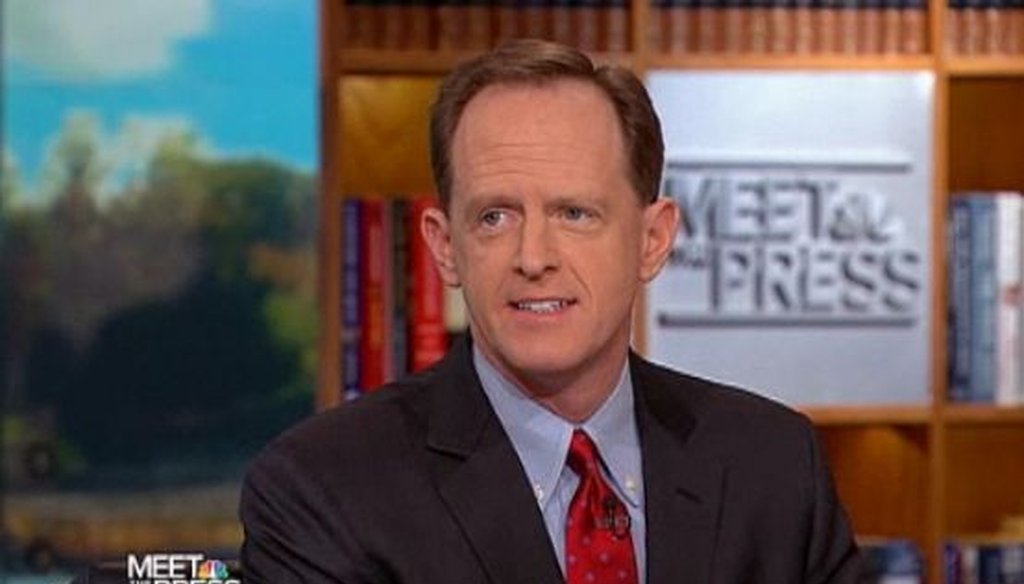Stand up for the facts!
Our only agenda is to publish the truth so you can be an informed participant in democracy.
We need your help.
I would like to contribute

Sen.-elect Pat Toomey, R-Pa., said during a Meet the Press roundtable that the U.S. has the world's highest corporate tax rates. We wondered whether he was correct.
Pat Toomey says U.S. has highest corporate tax rates in the world
On the Jan. 2, 2011, edition of NBC's Meet the Press, Sen.-elect Pat Toomey, R-Pa., cited a striking statistic in urging the United States to lower its corporate tax rates.
Asked by host David Gregory about possible areas where President Barack Obama and congressional Republicans can work together, Toomey suggested several areas, including taxes.
"I think tax policy is a possible area, one with plenty of landmines but plenty of opportunities," Toomey said. "Simplify the code, lower rates. We should be lowering corporate tax rates because we have the highest in the world right now." (Later in the roundtable discussion, Yale Law School professor Stephen Carter repeated the statistic, but we'll check Toomey's quote here.)
We wondered whether the U.S. really has the highest corporate tax rates in the world.
Using the most straightforward definition of "corporate tax rates," Toomey is right. The Organization for Economic Cooperation and Development, a group of 32 large, industrialized democracies, ranks the "combined corporate income tax rate" in its member nations. That means the highest tax bracket for general corporate income, excluding taxes levied on specific products or services.
For 2010, the U.S ranks second to Japan by a fraction of a percentage point -- 39.54 percent for Japan to 39.21 percent for the U.S. But that figure is already outdated: Japan has recently moved to cut its rate for 2011 by 5 percentage points, leaving the U.S. with the highest corporate tax rate among OECD nations.
But before we declare Toomey's statement True, let's dig a little deeper.
The OECD rate is the "statutory" rate -- that is, the top corporate tax rate on the books. But many companies pay considerably less than that, due to deductions and other exclusions. Adjusting for these factors produces a statistic called the "effective tax rate."
The World Bank has assembled data from 183 nations and made a series of statistical adjustments to produce a full international comparison of effective tax rates. By this measurement, the U.S. rate is considerably lower than the published rate -- 27.6 percent. But in a comparative sense, that's still pretty high: Among larger international economies, only Japan, New Zealand and Thailand produced a higher effective rate in the World Bank study. And Japan's number should fall by the time next year's study comes out.
The World Bank also produces another -- and broader -- statistic. This measure factors in not only the corporate profit tax but also a range of other taxes paid by businesses, including the cost of employee taxes borne by the employer. When the World Bank ranked countries from the lowest level of taxes to the highest, the U.S. ranked 124th out of 183 -- meaning corporate taxes were relatively high. A number of other large and/or democratic countries were higher, including Austria, Belgium, Brazil, China, France, Hungary, India, Italy, Spain and Sweden.
This last measure provides a wider snapshot of U.S. tax policy toward businesses, but it also introduces some complications. Factoring in the employer-paid portion of labor taxes makes the corporate tax rate seem higher in countries that provide higher benefits such as pensions or health care through business taxes, while making the rate seem lower for countries that provide less generous benefits through the tax code. So making apples-to-apples comparisons can be tricky.
There's also broader context that Toomey doesn't get into. In a previous item, we noted that when all taxes, including those such as personal income taxes and property taxes -- not just corporate taxes -- are taken into account and compared to gross domestic product, the U.S. doesn't rank near the top of the OECD table in total tax burden.
Still, if you rate Toomey on his specific wording by looking at "corporate tax rates," he's right that the U.S. does now have the highest corporate tax rates on the books, at least among the biggest industrialized democracies, which is most economists' typical yardstick. So we rate his statement Mostly True.
Our Sources
Pat Toomey, comments on NBC's Meet the Press, Jan. 2, 2010
Organization for Economic Cooperation and Development, "Basic (non-targeted) corporate income tax rates" (Table II.1), accessed Jan. 3, 2010
World Bank, "Paying Taxes 2011: The global picture," Nov. 18, 2010
Tax Foundation, "Top U.S. Corporate Tax Story for 2010: Japan to Cut its Corporate Tax Rate" (blog post) Dec. 23, 2010
Tax Foundation, "Comparing International Corporate Tax Rates: U.S. Corporate Tax Rate Increasingly Out of Line by Various Measures," August 2008
Laffer Associates, "The Remarkable Global Supply-Side Revolution" (paper by Daniel J. Mitchell), Jan. 14, 2008
PolitiFact, "Tim Pawlenty says the U.S. is not undertaxed compared to its competitors," July 29, 2010
Interview with Daniel J. Mitchell, senior fellow at the Cato Institute, Jan. 3, 2011
E-mail interview with Richard Morrison, spokesman for the Tax Foundation, Jan. 3, 2011
E-mail interview with Bob Williams, senior fellow at the Urban Institute-Brookings Instition Tax Policy Center, Jan. 3, 2011
Browse the Truth-O-Meter
More by Louis Jacobson
Pat Toomey says U.S. has highest corporate tax rates in the world
Support independent fact-checking.
Become a member!
In a world of wild talk and fake news, help us stand up for the facts.








































